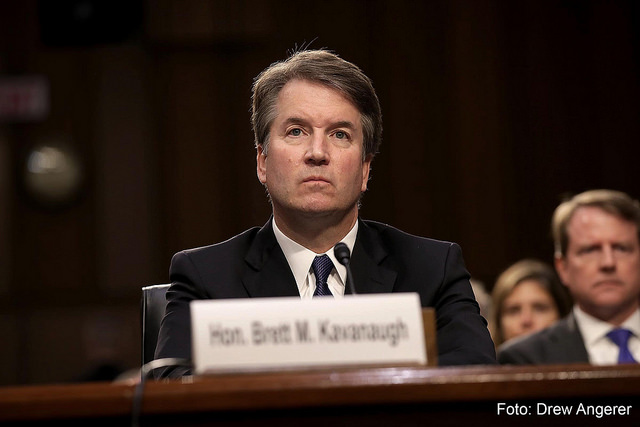Will the Supreme Court Come to Trump and Manafort’s Rescue?
A new case could change the rules of double jeopardy, potentially to the benefit of the president and his former campaign manager. Supreme Court Justice Brett Kavanaugh. (Jornal Grande Bahia / Flickr)
Supreme Court Justice Brett Kavanaugh. (Jornal Grande Bahia / Flickr)
This piece originally appeared on The Progressive.
In all likelihood, Terance Martez Gamble never thought he’d become a party in a landmark U.S. Supreme Court decision, let alone one on “double jeopardy”—the principle, inscribed in the Fifth Amendment, that prohibits criminal defendants from being tried and convicted twice for the same offense.
Yet that’s exactly what has happened to Gamble, a twenty-nine-year-old Alabama man with an eleventh-grade education, who is doing time in federal prison after being separately prosecuted by state and federal authorities for the same 2015 gun-possession crime. He is the petitioner in a case now before the U.S. Supreme Court called, Gamble vs. The United States of America.
Gamble’s lawyers maintain that his dual prosecutions run afoul of double jeopardy and the Fifth Amendment. The high court on December 6 heard oral argument on his appeal in an eighty-minute session, a sign of the heightened importance of the issues raised. Normally, the court devotes only an hour to oral argument.
The case, which has divided civil rights lawyers and civil liberties groups, could impact Special Counsel Robert Mueller’s Russia probe and affect President Donald Trump’s ability to pardon such targets of the probe as Paul Manafort, who are potentially exposed to both federal and state criminal liability.
Gamble’s legal troubles date back to 2008, when he was convicted in an Alabama court of second-degree robbery. Seven years later, his difficulties multiplied when was pulled over late at night by a police officer in Mobile, Alabama, for driving his black Dodge Charger with a broken headlight.
Upon approaching the car, the officer smelled marijuana coming from the passenger compartment. The officer ordered Gamble out of the vehicle and conducted a search, which disclosed a loaded 9mm handgun, a digital scale, and two baggies of marijuana.
Gamble was prosecuted in an Alabama court for violating state drug laws and being a felon in possession of a firearm. He was convicted and sentenced to a year in state prison, which he finished serving in May 2017.
While his state prosecution was pending, Gamble was indicted by a federal grand jury for illegally possessing the 9mm pistol under a federal statute that prohibits felons from possessing firearms. Gamble moved to dismiss the indictment on double-jeopardy grounds, but the presiding judge upheld the prosecution, citing long-standing Supreme Court precedent that has recognized a “separate-sovereigns” exception to the double-jeopardy rule. The exception permits successive state and federal prosecutions, even when based on the same facts.
Reserving the right to appeal his sentence, Gamble subsequently pleaded guilty and received a forty-six-month federal prison term. With credit for time spent in state custody, he is scheduled for release in February 2020.
Gamble is represented on a pro bono basis by Louis Chaiten, a partner with the powerful Jones Day law firm, which has offices across the country and in Europe and Asia. A former law clerk of the late Antonin Scalia, Chaiten urged the court on December 6 to overturn the separate-sovereigns doctrine, insisting the rule “is inconsistent with the text and original meaning of the double jeopardy clause.”
A formidable collection of civil-liberties groups—some from the right and some from the left—supported Chaiten and Gamble in briefs lodged in the case as amicus curiae, or “friends of the court.” In a rare joint submission, the ACLU and the liberal Constitutional Accountability Center teamed with the conservative Cato Institute in arguing that double jeopardy principles should have prevented Gamble from being punished twice for the same crime. The liberty interests protected by the double jeopardy clause, they reasoned, demand the same result for defendants who can be charged for the same offenses under both state and federal law.
Arguing against Chaiten was Eric Feigin, an Assistant Solicitor General, with the U.S. Department of Justice, who noted that the Supreme Court initially endorsed the concept in 1852. Feigin contended there was no compelling reason for invalidating such an age-old policy. He also asserted that the rule was entirely consistent with the original intent of the framers of the Constitution, who saw the states and the newly minted federal government as political equals that were free to punish wrongdoing as they saw fit.
Feigin’s position was echoed by a number of other amicus curiae, including one from the National Indigenous Women’s Resource Center, which pointed out in its filing that Native American women sometimes seek to go beyond unfavorable tribal court judgments to prosecute perpetrators of domestic violence in the federal system. A politically diverse group of thirty-six states, including Texas and Alabama as well as New York and California, also supported Feigin in a lengthy brief.
Still another notable amicus—the Thurgood Marshall Civil Rights Center of Howard University—implored the court to proceed with caution. The center reminded the justices of Rodney King, whose 1991 beating by Los Angeles police went unpunished at the state level, spurring a successful federal prosecution. It expressed concern that scuttling the separate-sovereigns doctrine could prevent federal civil rights prosecutions from being instituted following acquittals in state-court police misconduct trials.
During the December 6 oral argument, the court appeared as divided as the litigants and the amici, but not along the usual ideological lines. Liberal stalwart Justice Ruth Bader Ginsburg referred to the separate-sovereigns doctrine disparagingly as a “double whammy.” By contrast, two other liberal justices—Elena Kagan and Stephen Breyer—voiced approval of the principle.
Among the panel’s conservatives, Chief Justice John Roberts and Justice Samuel Alito also seemed inclined to uphold the doctrine, while Justice Neil Gorsuch remarked on the merits of each side’s views.
Should the court end up keeping the separate-sovereigns precedent intact, the biggest losers in the case, apart from Gamble, could be Trump and Manafort, the President’s former campaign manager, who has been convicted of federal offenses for bank fraud and tax evasion that arguably also violate the laws of several states.
In a November 28 interview with the New York Post, Trump declined to take the possibility of a pardon for Manafort “off the table.” If the court upholds the separate-sovereigns doctrine, however, Manafort and other vulnerable Trump aides and associates—think Roger Stone, Jared Kushner, Donald Trump Jr.—could in theory be charged for any overlapping state offenses, as could even Trump himself. Presidential pardons would be of little benefit as they do not affect state prosecutions.
A ruling the other way, dismantling the separate-sovereigns framework, would bolster Trump’s pardon power and perhaps hand Manafort an early get-out-of-jail card.
We’ll get the Supreme Court’s verdict by the end of June, when its current term concludes. Until then, Trump will have his hands full dealing with the Mueller probe, and Manafort will continue to languish in an orange jumpsuit behind bars.
Your support matters…Independent journalism is under threat and overshadowed by heavily funded mainstream media.
You can help level the playing field. Become a member.
Your tax-deductible contribution keeps us digging beneath the headlines to give you thought-provoking, investigative reporting and analysis that unearths what's really happening- without compromise.
Give today to support our courageous, independent journalists.









You need to be a supporter to comment.
There are currently no responses to this article.
Be the first to respond.